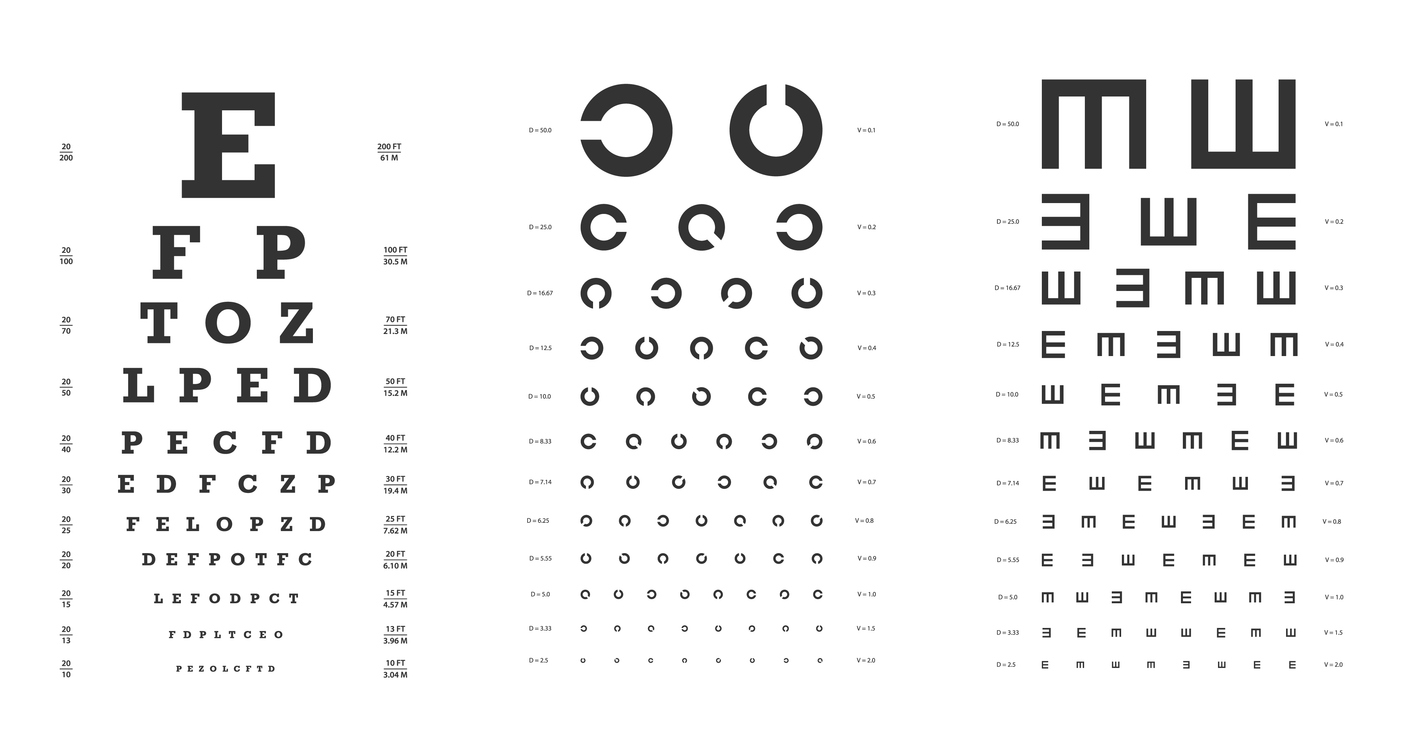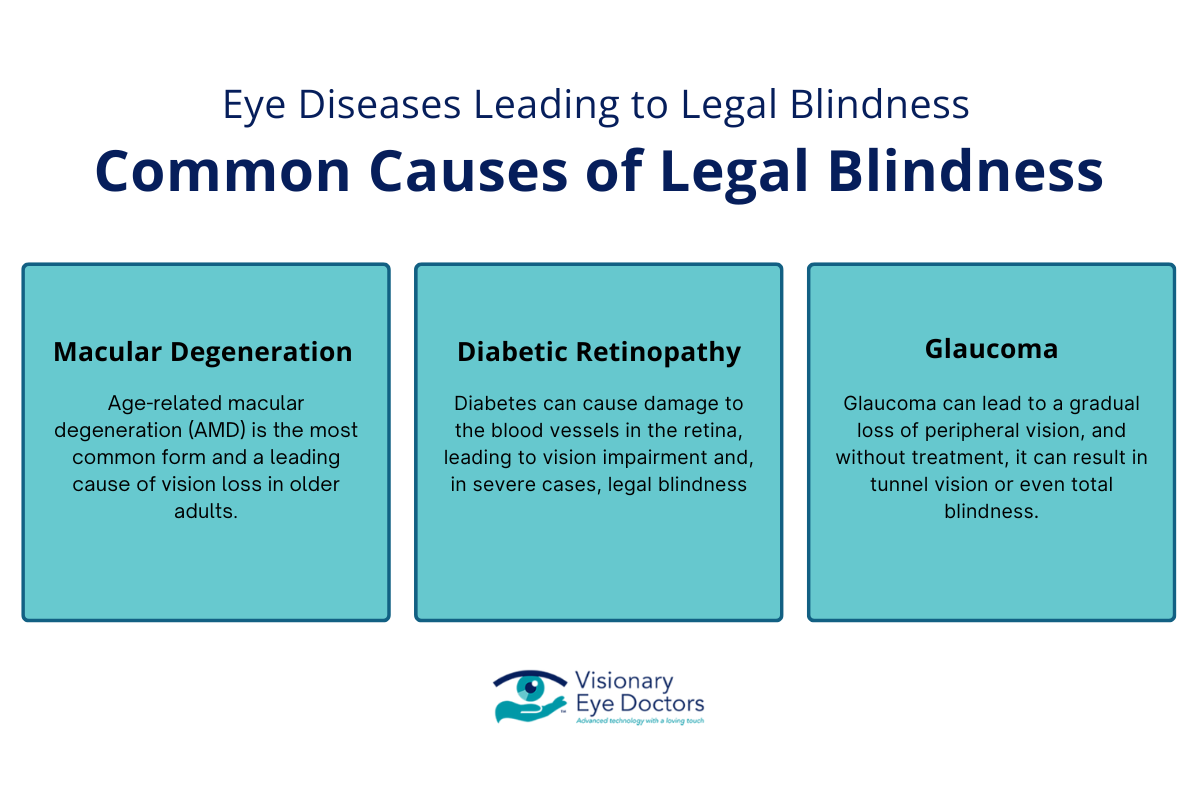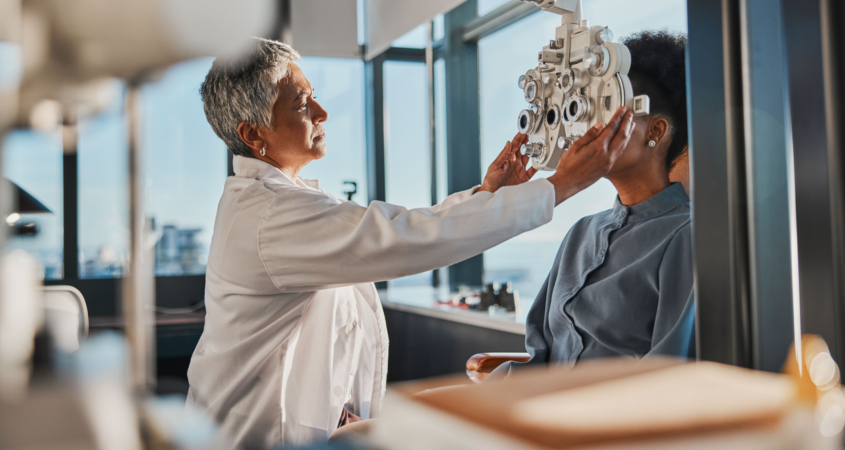What Prescription is Legally Blind? Understanding the Criteria and Causes
Legal blindness in the United States is defined as having an eye prescription of 20/200 or worse in the better eye with corrective lenses, or a visual field of 20 degrees or less.
Legal blindness is a specific level of vision loss defined by law to determine eligibility for certain services and benefits. It is important to note that being legally blind does not mean a person has total blindness; rather, it indicates a significant level of visual impairment.
Understanding the criteria for legal blindness is crucial for recognizing the severity of visual impairment. It helps in accessing necessary support, including disability benefits and specialized services designed to aid those with significant vision loss.
Criteria for Legal Blindness

Central Visual Acuity
Central visual acuity refers to the clarity or sharpness of vision when looking directly at an object. It is typically measured using an eye chart, technically referred to as a Snellen chart, which displays letters of decreasing size. The standard measure of normal vision is 20/20. Legal blindness is defined as having a visual acuity of 20/200 or worse in the better eye with corrective lenses. This means that while a person with normal vision can see from 200 feet away, a legally blind person can only see clearly from 20 feet away. If a person’s central visual acuity cannot be corrected to better than 20/200 with glasses or contact lenses, they are considered legally blind. This severe limitation impacts their ability to perform daily tasks that rely on clear central vision.
Visual Field
The visual field encompasses the entire area a person can see when looking straight ahead, including peripheral vision. Visual field tests measure the range of vision and detect any areas where sight is reduced or lost. Legal blindness can also be determined by a visual field of 20 degrees or less, often described as tunnel vision. Individuals with this condition have very limited peripheral vision, making it difficult to see objects not directly in front of them. Several eye conditions can reduce the visual field, including retinitis pigmentosa, glaucoma, and optic nerve damage. These conditions can severely restrict a person’s ability to navigate and be aware of their surroundings.
Common Causes of Legal Blindness
Eye Diseases Leading to Legal Blindness

Several eye diseases can lead to legal blindness by affecting either central visual acuity or the visual field. Understanding these conditions can help in early detection and management.
- Macular Degeneration: This condition affects the macula, the central part of the retina responsible for sharp vision. It leads to a loss of central vision, making tasks like reading and recognizing faces difficult. Age-related macular degeneration (AMD) is the most common form and a leading cause of vision loss in older adults.
- Diabetic Retinopathy: Diabetes can cause damage to the blood vessels in the retina, leading to vision impairment and, in severe cases, legal blindness. Diabetic retinopathy often progresses without early warning signs, highlighting the importance of regular eye exams for individuals with diabetes.
- Glaucoma: This group of eye conditions damages the optic nerve, often due to high intraocular pressure. Glaucoma can lead to a gradual loss of peripheral vision, and without treatment, it can result in tunnel vision or even total blindness.
Other Factors Contributing to Legal Blindness
Beyond eye diseases, other factors can also contribute to significant vision loss that meets the criteria for legal blindness.
- Retinitis Pigmentosa: A genetic disorder that causes the breakdown and loss of cells in the retina. This condition typically leads to a gradual decline in peripheral vision, night vision difficulties, and eventual tunnel vision.
- Severe Refractive Errors: Extreme cases of nearsightedness or farsightedness can contribute to legal blindness if they cannot be corrected with standard prescription eyewear. These severe refractive errors interfere with visual acuity and the ability to perform daily tasks.
- Accidents and Injuries: Traumatic events that cause significant damage to the eyes or optic nerve can lead to sudden and irreversible vision loss. These cases highlight the importance of eye protection in hazardous environments.
Living with Legal Blindness
Daily Life and Challenges
Living with legal blindness presents numerous challenges that affect daily activities and overall quality of life. Tasks that people with normal vision may take for granted can become significant obstacles.
- Impact on Daily Tasks: Legal blindness can make it difficult to perform everyday activities such as reading, writing, cooking, and navigating unfamiliar environments. People with legal blindness often need to develop new strategies and use assistive devices to complete these tasks.
- Assistive Devices and Visual Aids: To help manage daily activities, many people with legal blindness rely on various assistive devices and visual aids. These can include magnifiers, screen readers, braille displays, and specialized software that enhances contrast or reads text aloud. These tools can greatly enhance a person’s ability to live independently and maintain their quality of life.
Legal and Financial
Support Understanding the support available to those with legal blindness is crucial for accessing the resources needed to manage the condition effectively.
- Disability Benefits: Individuals who are legally blind may be eligible for disability benefits through programs such as Social Security Disability Insurance (SSDI) or Supplemental Security Income (SSI). These benefits provide financial assistance to help cover living expenses and medical costs.
- Financial Assistance: Additional financial aid may be available through various organizations and government programs designed to support those with vision impairments. These programs can help cover the cost of assistive devices, rehabilitation services, and other essential resources.
The Importance of Regular Eye Care
Maintaining regular eye care is essential for individuals with legal blindness to preserve their remaining vision and prevent further deterioration.
- Routine Eye Exams: Regular eye exams are crucial for monitoring eye health and detecting any changes in vision. Eye doctors can provide valuable guidance on managing vision loss and recommend treatments or adjustments to assistive devices as needed.
- Comprehensive Services: Visionary Eye Doctors offers a range of services to support individuals with legal blindness, including specialized eye exams, prescription eyewear, and contact lenses. Our team of experienced optometrists and ophthalmologists is dedicated to helping patients achieve the best possible vision and maintain their overall eye health.
Visionary Eye Doctors: Comprehensive Eye Care for All Levels of Refractive Error
At Visionary Eye Doctors, we understand the profound impact that legal blindness can have on daily life. Our comprehensive range of services supports individuals with significant vision loss, helping them maintain independence and quality of life. We provide thorough eye exams using the latest diagnostic technology to monitor eye health and detect changes in vision. Our selection of prescription eyewear, including specialized glasses and contact lenses, is tailored to meet the unique needs of our patients.
We utilize Optomap technology for detailed retinal imaging without the need for dilation, aiding in early detection and management of conditions leading to legal blindness. Our treatment options include the latest advancements in eye care, from innovative surgical techniques to state-of-the-art visual aids, ensuring effective care.
Our experienced team provides personalized care, developing tailored treatment plans that maximize remaining vision and improve quality of life. We offer ongoing support and guidance, helping you navigate the challenges of legal blindness with confidence.
If you or a loved one is experiencing significant vision loss, seeking professional eye care is crucial. Regular eye exams and early intervention can make a significant difference in managing legal blindness and preserving vision. At Visionary Eye Doctors, we are dedicated to helping you achieve the best possible outcomes for your eye health.
Take the next step in managing your vision health by scheduling an appointment with Visionary Eye Doctors. Contact us today to book an eye exam or consultation and learn more about how we can help you maintain your independence and quality of life.



